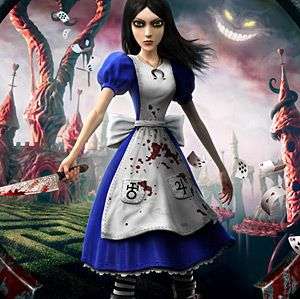Am I Going Mad?
by Jo
 It’s one of those subjects that, despite so many people speaking out, is still considered taboo; with mental health affecting one in four people every year in the United Kingdom [mind.org.uk, 2013], it is a surprise that it is the cause of hushed and embarrassed discussion. Long gone, supposedly, are the days when mental health was swept under the rug, with big names such as Stephen Fry and Ruby Wax fronting a very vocal campaign and visible awareness campaigns growing in number in general media, it is encouraged that people discuss mental health. How then, given this support of mental health awareness, is it represented in the games industry, and how responsibly are developers using it to further their stories? Is this representation detrimental, or could it effectively be helping those suffering to express themselves in a whole new way?
It’s one of those subjects that, despite so many people speaking out, is still considered taboo; with mental health affecting one in four people every year in the United Kingdom [mind.org.uk, 2013], it is a surprise that it is the cause of hushed and embarrassed discussion. Long gone, supposedly, are the days when mental health was swept under the rug, with big names such as Stephen Fry and Ruby Wax fronting a very vocal campaign and visible awareness campaigns growing in number in general media, it is encouraged that people discuss mental health. How then, given this support of mental health awareness, is it represented in the games industry, and how responsibly are developers using it to further their stories? Is this representation detrimental, or could it effectively be helping those suffering to express themselves in a whole new way?
Two high profile names in particular use mental illness (more specifically lunacy) as a driving force within the development of their plot line. The first, and obvious choice, is American McGee’s Alice. The recent sequel, Alice: Madness Returns, has caused me something of a bother for some time now. As a psychological horror game, Madness Returns is attractive. Within the first few short minutes my jaw had dropped, and visually it is devastatingly beautiful; gothic horror tropes left right and centre, it was a wonderful reimagining of Carroll’s popular children’s book. The literature nerd in me was quivering, and I was soon in love. However, the further I progressed, and once I’d got over the stunning visuals, I had to wonder about the girl who had become my puppet – what was wrong with Alice?
 Those who know her back story will know that she had suffered a rather unfortunate and twisted past, and at the start of Madness Returns, Alice has been freed from the insane asylum that was formerly her home, and is living in an orphanage in London. However, as the games name suggests, after having believed herself cured of her sickness, Alice’s madness returns. While set in 1875, a time when, historically, the treatment of mental health was horrific and violent guesswork at best, Alice: Madness Returns isn’t wholly detrimental to the progression of mental health awareness. However, what worried me was that it applies a sense of haunting beauty and gothic charm to psychosis; “she may be mad, but this world that’s she’s built for herself is kinda cool” is not a great mentality. That being said, the use of insanity in Alice: Madness Returns is at least a key and integral part of the plot throughout the game, unlike its use in the blockbuster release Call of Duty: Black Ops.
Those who know her back story will know that she had suffered a rather unfortunate and twisted past, and at the start of Madness Returns, Alice has been freed from the insane asylum that was formerly her home, and is living in an orphanage in London. However, as the games name suggests, after having believed herself cured of her sickness, Alice’s madness returns. While set in 1875, a time when, historically, the treatment of mental health was horrific and violent guesswork at best, Alice: Madness Returns isn’t wholly detrimental to the progression of mental health awareness. However, what worried me was that it applies a sense of haunting beauty and gothic charm to psychosis; “she may be mad, but this world that’s she’s built for herself is kinda cool” is not a great mentality. That being said, the use of insanity in Alice: Madness Returns is at least a key and integral part of the plot throughout the game, unlike its use in the blockbuster release Call of Duty: Black Ops.
The release of Black Ops was something I had anticipated for a long time. As a fan of the Call of Duty franchise for many years, and being a particular fan of the Modern Warfare games, the release of Black Ops excited me; it was something new and I knew I was not alone in feeling this, with the game selling 5.6 million copies in the UK and US in the first 24 hours. Potential spoilers incoming – be warned. I ground my way through level after level, ever eager to reach the climax. Something about the story was definitely suspect and I wanted to know what the hell was going on. All I knew was that now I’d been captured; I was being held captive in a Saw-esque room, surrounded by static filled computer screens while a disembodied voice was pumping me for questions and growing ever more frantic and frustrated as I was recalling past memories as best as possible. When I reached the climax of the game – the big reveal – I was disappointed with the result. My character had had a psychotic event after being brainwashed and unknowingly becoming a Soviet sleeper agent; many of his actions which, throughout the recollections of the past had appeared to have been performed by another character, were actually all down to him.
This reveal frustrated me beyond belief; it’s clichéd beyond all hell and is shamelessly lazy. Granted, it doesn’t portray mental health in a derogatory fashion, but I genuinely feel annoyance at how easily they just threw in “oh, by the way this guy messed everything up and put the fate of the US at risk because he’s nuts. lulz”. To me it started to translate to “fear the ones with dissociative identity disorder – they’ll bring about the downfall of the world as we know it”. Okay, granted, that’s not what they meant to portray, but still – that’s a twist that really should be treated with care and not just bashed in there to explain what was, until that point, an intriguing storyline with what could potentially have been a great bad guy. Post Traumatic Stress Disorder and Dissociative Personality Disorder are genuine and serious illnesses; I know they say that any publicity is good publicity, but I can help but feel that by using them in this way that they’re misrepresenting and possibly even belittling what is a serious and still very current issue.
 While games can use mental illness, not necessarily to achieve positive results, mental illness too can use games for the positive. I know that I’ve considered a good gaming session to be more than medicinal and stress-busting, but can they actually be used to treat those suffering from mental illness? Based on a pilot study made by Dr Karolina Stasiak as part of her PhD, SPARX the game was developed in order to help combat depression in teens. Funded by the New Zealand Ministry of Health, and developed by a group of specialists in treating adolescent depression at the University of Aukland, SPARX is designed to help depressed teens to help themselves:
While games can use mental illness, not necessarily to achieve positive results, mental illness too can use games for the positive. I know that I’ve considered a good gaming session to be more than medicinal and stress-busting, but can they actually be used to treat those suffering from mental illness? Based on a pilot study made by Dr Karolina Stasiak as part of her PhD, SPARX the game was developed in order to help combat depression in teens. Funded by the New Zealand Ministry of Health, and developed by a group of specialists in treating adolescent depression at the University of Aukland, SPARX is designed to help depressed teens to help themselves:
“In order to actively engage young people, SPARX uses a 3D fantasy game environment and a custom-made soundtrack. The program teaches skills to manage symptoms of depression, in a self-directed learning format. Young people learn cognitive behavioural therapy techniques for dealing with symptoms of depression (e.g. dealing with negative thoughts, problem-solving, activity scheduling, and relaxation). It can be used with minimal oversight” [http://sparx.org.nz/]
 While not currently available for distribution, the creators of SPARX are looking into general release of the game later this year. This research alone not only shows the positive impact that games can have in the treatment of mental illness, and how much they can impact views of mental health, but challenges the perception that playing videogames is a main cause of mental illness [most notably an argument used with school shootings and brutal spree killings].
While not currently available for distribution, the creators of SPARX are looking into general release of the game later this year. This research alone not only shows the positive impact that games can have in the treatment of mental illness, and how much they can impact views of mental health, but challenges the perception that playing videogames is a main cause of mental illness [most notably an argument used with school shootings and brutal spree killings].
With the media raring to blame videogames and their developers for being the root of the sufferer’s mental episode, shouldn’t games companies pay more attention to mental illness awareness? It’s easy for people to default and say “oh, he plays videogames, clearly he was a nutter”, but perhaps if awareness of mental illness is increased, and these stereotypes broken, games companies will take less of the flak. By taking a much more proactive approach in their games and not utilizing clichéd and often stereotyped examples of illnesses just to progress a story in the simplest way possible, the industry could possibly help in stopping this perpetuated myth. They have a way to reach out and not only promote awareness of these illnesses, but possibly help to treat them and help themselves in the process.
Last five articles by Jo
- The Nostalgia Box Time Machine
- I Am Runner Five
- Best of 2013: The Not-So Gamescom Diary
- The Not-So Gamescom Diary
- Pokémon Mystery Dungeon: Gates To Infinity - Review




















There are no comments, yet.
Why don’t you be the first? Come on, you know you want to!